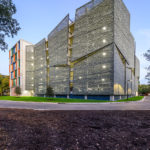
The five-story, 60’s era West Hills Medical Office Building in Los Angeles was due for an exterior facelift. A complete exterior renovation by Michael W. Folonis Architects revealed that water infiltration had caused structural damage to the existing horizontal plaster awnings; removing them was a costly process that consumed much of the project budget.
This left a relatively tight budget for the design, development, and installation of what would be the new exterior facade. Working with the architects, Structurflex helped create a tensile mesh facade supported by a lightweight aluminum structure and steel standoffs. The resulting “floating skin” provides privacy and reduces solar gain from the blistering California sun, as well as reducing interior glare. The panels are composed in a specific way to reflect the architects’ vision of suggesting gestural strokes of paint.
Using tensile mesh instead of traditional metal mesh or perforated metal saved the client nearly 50% of the materials cost. Because tensile mesh is also significantly lighter than metal facades, a lighter structural system could be used. Less energy is required to produce tensile mesh fabric than metal facades, and the entire tensile mesh system is composed of 100% recyclable materials, making it particularly attractive for buildings in locations – like Los Angeles – with strict environmental regulations.
The five-story, 60’s era West Hills Medical Office Building in Los Angeles was due for an exterior facelift. A complete exterior renovation by Michael W. Folonis Architects revealed that water infiltration had caused structural damage to the existing horizontal plaster awnings; removing them was a costly process that consumed much of the project budget. This […]

We are pleased to have collaborated with KieranTimberlake and the outfit of a parking structure on the Rice University Campus. In their blog post, they describe the concepts they employed to create an iconic sculptural element. For more details see the KieranTimberlake blog post.